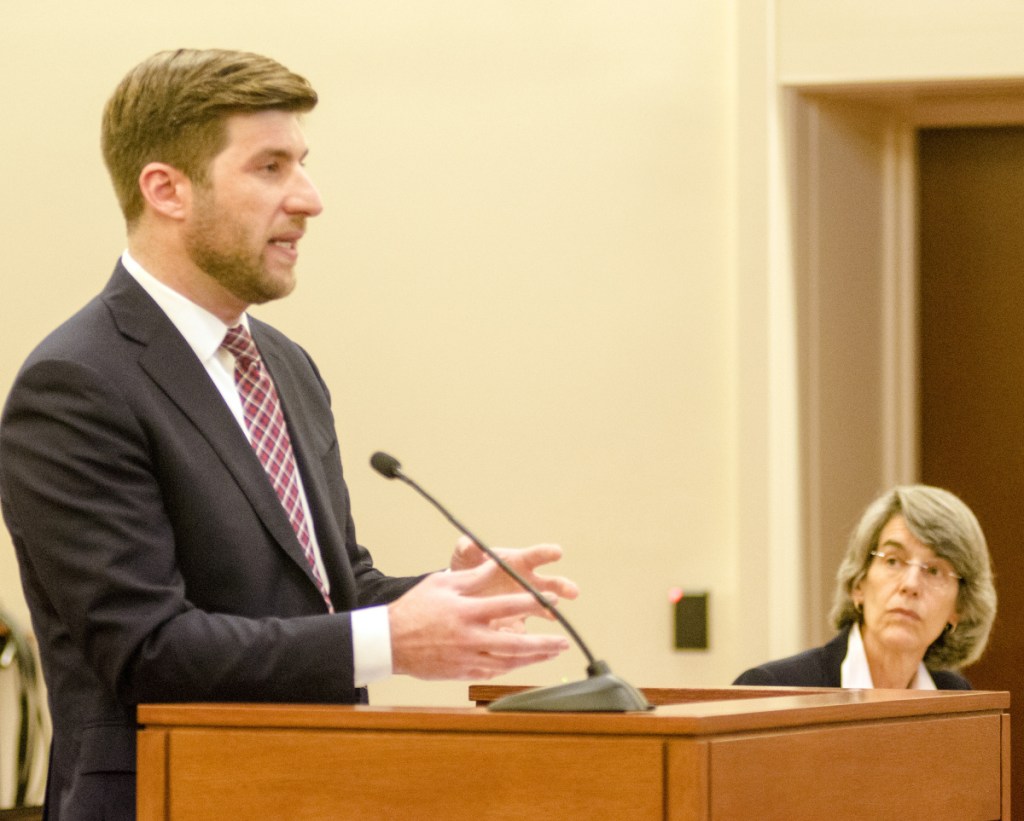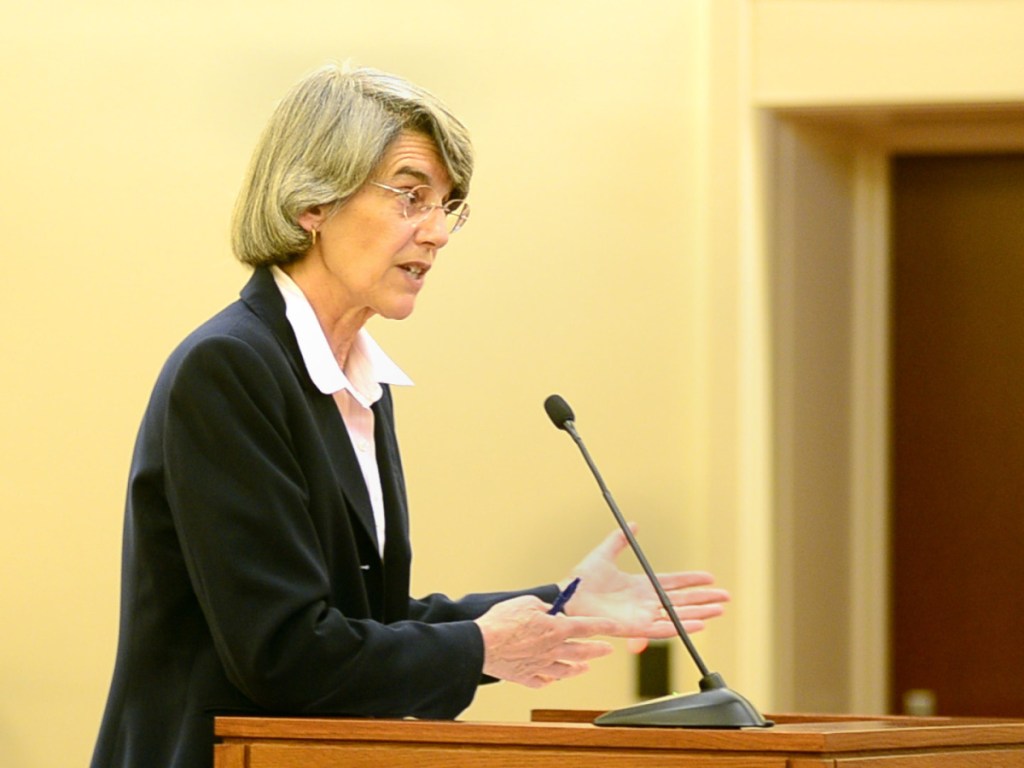
Superior Court Justice Michaela Murphy asks an attorney a question during Friday’s hearing about ranked-choice voting.
AUGUSTA — Attorneys for Secretary of State Matthew Dunlap and the group behind Maine’s ranked-choice voting law both asked a Superior Court Justice on Friday to quickly resolve legal questions about the law and clear the way for the state to hold the nation’s first election using the ranked-choice system in June.
The attorneys appeared before Kennebec County Superior Court Justice Michaela Murphy a day after Dunlap cast doubt on Maine’s plans by saying the discovery of conflicting language in the existing law requires a legislative fix to ensure that the ranked-choice system can be used in June. The Committee for Ranked Choice Voting quickly filed a complaint seeking a court injunction order requiring Dunlap to move forward with implementing the law approved by Maine voters in 2016.
On Friday, both Phyllis Gardiner, an assistant attorney general representing the Secretary of State’s Office, and James Monteleone, an attorney representing the Committee for Ranked Choice Voting, said they believed Murphy should rule that ranked-choice voting should remain in place for the June primary.
Both sides urged the judge to quickly resolve the legal questions and, with preparations underway for the June 12 election, Murphy said Friday she could decide the questions within “a matter of days.”
Also Friday, Gardiner said Maine Attorney General Janet Mills was not involved in the case, a reflection of the political criticism that Mills faced since her office first raised legal questions about the law.
Mills, who will be on the Democratic primary ballot as a candidate for governor, said Thursday that she has had no involvement in the ranked-choice voting issue and had not discussed it with Gardiner because she wanted to avoid conflicts. But Mills also said Thursday that she would introduce legislation to resolve the legal confusion and preserve the law that voters passed.
Some of her Democratic rivals on Thursday accused the Attorney General’s Office of casting doubt on the legality of ranked-choice voting to give Mills a better chance of winning the primary. On Friday, Mills was criticized by the Maine Republican Party for proposing a legislative fix and breaking down what she had previously described as an “ethical wall” that kept her from getting involved in the issue.
“This is not right,” Maine Republican Party spokesman Garrett Murch said in a prepared statement. “Mills should stand down, leave the ‘ethical wall’ in place, and rely on her team who have been working on this issue for months.”
It was not immediately clear when the court would issue its order.
Murphy, who called the parties before her Friday, initially said she believed she needed to act by Monday, but later learned the deadline for her decision could be stretched beyond that, as long as a final answer on what voting procedure Mainers should use in June is settled within the next 10 days to two weeks, Gardiner said.
At issue for the court is whether a portion of the statute that references a plurality vote in primary elections should negate the intent of the ranked-choice law, which requires the winner to receive a majority of the votes – more than 50 percent.
In a traditional election, whoever gets the most votes wins, whether it is a majority or a plurality, which can be less than 50 percent. Under the ranked-choice system, voters select candidates in order of preference. If no candidate receives more than 50 percent of the vote, the candidate with the fewest first-choice votes is eliminated. Voters who preferred the eliminated candidate would then have their ballots added to the totals of their second-ranked candidates, and the ballots would be retabulated. The process continues until one candidate has a clear majority of votes.
Both attorneys argued that voters intended the new law to cover the primary election.
“The printed petition, with the summary on it that voters signed, and certainly the educational materials that were provided by the secretary of state in the citizen’s guide to the Nov. 2016 election, would have made clear that primaries were included, so I don’t disagree at all that, that would have been the voters’ intent,” Gardiner told Murphy.
Likewise, Monteleone said there was little doubt that the ballot question made it that clear ranked-choice voting was intended for all statewide elections, including primaries.
He said media reports Thursday suggested Dunlap had suspended implementation of the law, prompting the committee to seek judicial intervention to ensure the law was followed. Dunlap said later Thursday that, while he was reviewing those concerns, he was still moving forward with implementation.
“In the course of just a day, (Dunlap) created deep-seated confusion about what is the direction of ranked-choice voting for the primary election,” Monteleone said. “The understanding of what election system would be in play in June of this year is of critical importance both to the candidates and the general public who will be casting votes in that election.”
He said the committee filed for an injunction against Dunlap, “hoping to gain some clarity to what was the implementation plan in light of this conflict.”
Monteleone argued that Murphy could resolve the conflict by using a finding of “implied repeal,” which a judge can order when an apparent conflict exists in a statute but the intent of the legislature or the voters is clear.
Murphy said the ruling is rarely used and is frowned upon by the state’s Supreme Judicial Court because corrections to conflicting statutes are best resolved in the Legislature. But Murphy also hinted she could rule the conflicting language in the law created ambiguity and therefore the most recently added segment of law should prevail. That would mean the 2016 ballot vote would overrule the section of statute Dunlap raised as a concern Thursday.
Gardiner seemed to agree with Monteleone that Murphy should find that the citizen-approved law would create an implied repeal, noting it was unique in this case because the law wasn’t written by the Legislature, but by the people directly. Murphy said she believed either finding would be a first in Maine legal history.
Dunlap first made the issue public Thursday, saying his office learned Wednesday about “legal concerns regarding the implementation of ranked-choice voting” caused by conflicting sections of the law dealing with whether primary candidates are elected by a majority or a plurality of votes.
Gardiner said Dunlap raised the issue this week because he wanted clarity and didn’t want the issue to be raised after a ranked-choice election had been conducted in June and then possibly called into question. “His concern and my concern was that if not aired and addressed in some fashion, if this issue were left to be a sleeper, if you will, until June, you could have a situation where a candidate says in the middle of a ranked-choice voting count, perhaps in the June primary, that they have gotten a plurality and this should not be continuing and raise the issue at that point,” Gardiner said. “That’s why it seemed important to address, and that’s why we were in agreement with bringing this issue to the court today.”
Murphy then asked Gardiner if she was in agreement with the Committee for Ranked Choice Voting.
“They think the intent of the citizen’s initiative is quite clear, in terms of what was intended by Maine voters when they wanted ranked-choice voting,” Murphy said. “Does the secretary of state quarrel with that analysis at all, as far as what the intent of the initiative was?”
“No, we don’t your honor,” Gardiner responded.
Murphy said Friday she understood the urgency in responding to Monteleone’s concern that Dunlap’s actions on Thursday had created confusion that required immediate clarification.
“I think the voters are entitled to have some clarity as to what the state of the law is and we need to inject some stability into this process, I think we would all agree with that,” Murphy said. “So if we are talking about any delay at all, we are talking about just a matter of days.”
Scott Thistle can be contacted at 713-6720 or at:
sthistle@pressherald.com
Twitter: thisdog
Copy the Story LinkSend questions/comments to the editors.





Success. Please wait for the page to reload. If the page does not reload within 5 seconds, please refresh the page.
Enter your email and password to access comments.
Hi, to comment on stories you must . This profile is in addition to your subscription and website login.
Already have a commenting profile? .
Invalid username/password.
Please check your email to confirm and complete your registration.
Only subscribers are eligible to post comments. Please subscribe or login first for digital access. Here’s why.
Use the form below to reset your password. When you've submitted your account email, we will send an email with a reset code.